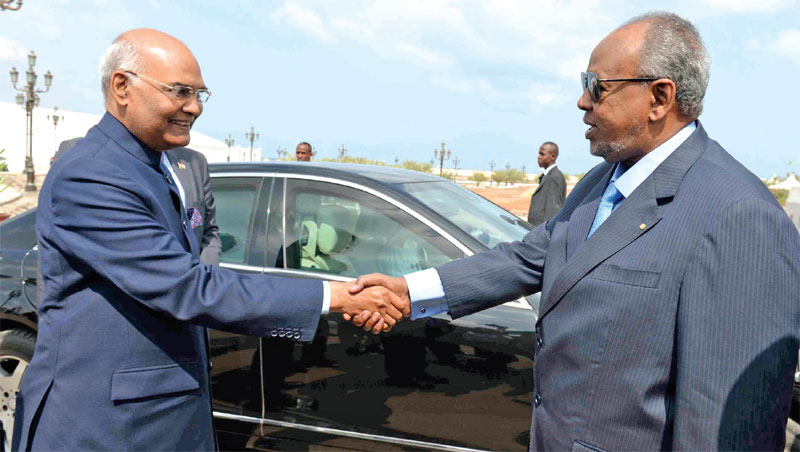India and the BRI | O Djibouti!
Smruti D
In 2015, when Saudi Arabia launched a military intervention in the war-torn Yemen, the Indian armed forces carried out ‘Operation Rahat’ and succeeded in evacuating thousands of Indians and foreigners. At the time, Djibouti, a tiny African country that sits across the Bab-el-Mandeb strait from Yemen, helped greatly in the evacuation process. The evacuees were advised to gather at Sanaa and Aden in Yemen, from where the Indian Air Force (IAF) and the Indian Navy transported them to Djibouti and were in turn brought back to India. Although India and Djibouti have shared bilateral ties, China’s acquisition of a military base in the country has put the Indian authorities on alert in the recent years. As a result, India has actively increased its diplomatic outreach to Djibouti, but still a lot remains to be done.

President Ram Nath Kovind being received by the President of Djibouti, Ismail Omar Guelleh, during former’s visit to the coastal nation in October 2017
In his official capacity in 2017, President Ram Nath Kovind’s first international tour took him to two African neighbours—Djibouti and Ethiopia. The timing of the President’s visit coincided with China formally opening its first international military base adjacent to the Port of Doraleh in the country, just a month before the visit. Djibouti’s geostrategic and geopolitical importance cannot be over-emphasised, which is why, much to India’s concern, China has occupied a base there.
Why is Djibouti Important?
Djibouti, located in the Horn of Africa, sits on the north-western edge of the Indian Ocean. The country stretches 23,200sqkm and is bordered by Somalia, Ethiopia, Eritrea and the Red Sea. The Red Sea separates Asia from Africa. Djibouti’s strategic location makes it overlook the Bab-el Mandeb strait, which is a gateway to one of the world’s busiest trade route, the Suez Canal.
The Horn of Africa is a region rife with conflicts, deprivation and other problems such as famine and war. What has made Djibouti stand out from its neighbours has been its ability to sustain itself as a relatively peaceful country in a region known for its volatility. As a result of which, the US, France, Japan and Italy have already occupied military bases in the country. China is the newest country to have secured one base there. The French base also hosts German and Spanish contingencies.
Huge investments are made by richer countries in Djibouti which has little to offer apart from its geographic location. The country is hot and the natural soil in the country is mainly sand—factors that do not give Djibouti much of a scope to produce its own natural resources, as a result of which, everything including basic necessities such as water and food are imported. The country suffers from high unemployment rate. Ports are the lifeline of Djibouti’s economy, allowing larger countries to set up their bases there works well in its interests as it proves to be the most prominent source of income, which in turn helps with employment of its own people. Global powers look at Djibouti as a place of strategic and economic significance. Even as their presence is debated, foreign powers have set up bases across the continent. Today, Africa hosts bases of 13 foreign countries, of which five are in Djibouti. The prominent reason for the presence of foreign powers there is to curb the heavy militancy prevalent across the continent, a factor that holds the capability to hurt international peace. Djibouti’s geographic proximity to some of the hotbeds of unrest in the world, namely Yemen and Somalia, make it a sought-after country. Djibouti’s location provides foreign powers the benefit of close observation and intervention when conflicts arise. They also carry out humanitarian and peace-keeping missions. Apart from these, foreign powers also look at financial benefits that would accrue in the future from these regions. Djibouti is the main port for landlocked Ethiopia, which is one of the fastest-growing economies in Africa.
Research fellow, Indian Council of World Affairs, Sankalp Gurjar says, “Djibouti’s location near the straits of Bab-el-Mandeb is its biggest asset. In colonial times, Djibouti was a French outpost and served as a key point projecting French influence in East Africa, Western Indian Ocean and the Middle East. In the last few years, because of the intensifying geopolitical competition in the Red Sea region, Djibouti has emerged as one of the most important countries in the world and hosts military bases of major powers like France, US, China and Japan. It is closer to the contemporary geopolitical hotspots such as the East Africa and the energy-rich region of the Middle East.”
1
As there are a number of militant groups present in the region, piracy poses a threat to international shipping. For coastal countries such activities hamper growth and bring in more poverty. As countries in the Horn struggle with military resources in curbing the menace of piracy, international participation has played a greater role. The Bab-el Mandeb strait is a vital link in transportation between the Mediterranean and Asia. Oil from the Middle East is carried to the West via this strait. Although there are alternative routes that ships can take, it takes more time to reach and is expensive. As per the Bloomberg tanker tracking data, a voyage from Saudi Arabia to Rotterdam takes about 22 days via the Bal el-Mandeb and Suez Canal, compared with 39 days around Africa. The same data also st
Subscribe To Force
Fuel Fearless Journalism with Your Yearly Subscription
SUBSCRIBE NOW
We don’t tell you how to do your job…
But we put the environment in which you do your job in perspective, so that when you step out you do so with the complete picture.







